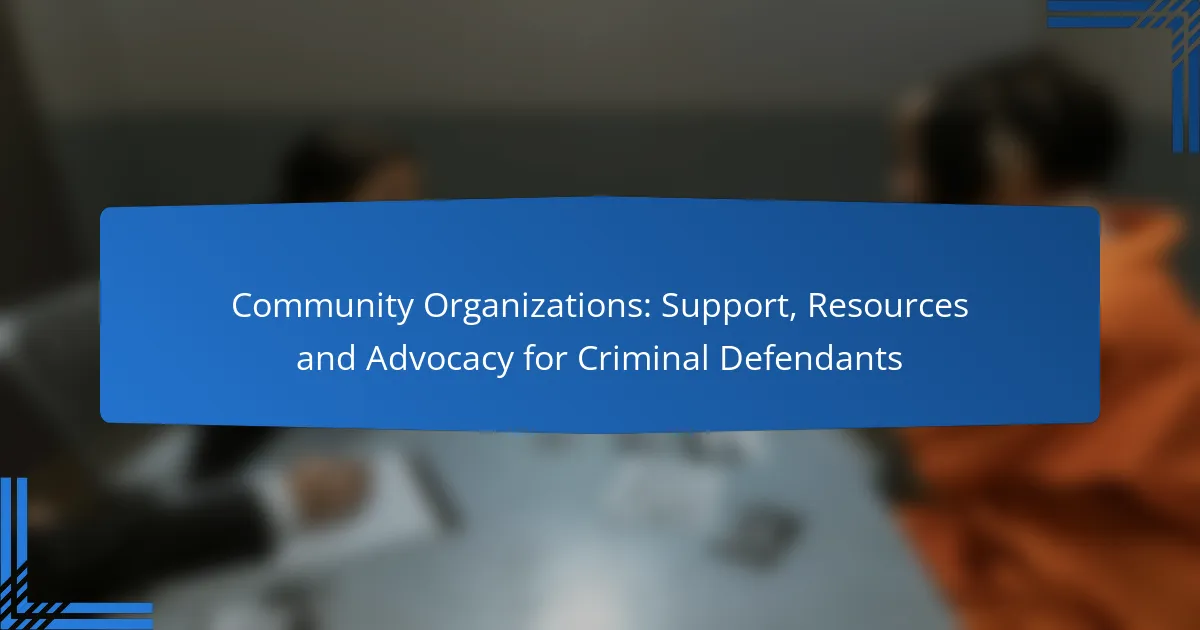Community organizations play a crucial role in supporting criminal defendants by providing essential services such as legal representation, emotional support, and resource referrals. These organizations help individuals navigate the complexities of the criminal justice system, ensuring they have access to the necessary tools and advocacy needed for fair treatment. Through legal aid clinics and outreach programs, defendants can find vital resources that empower them in their legal journeys.
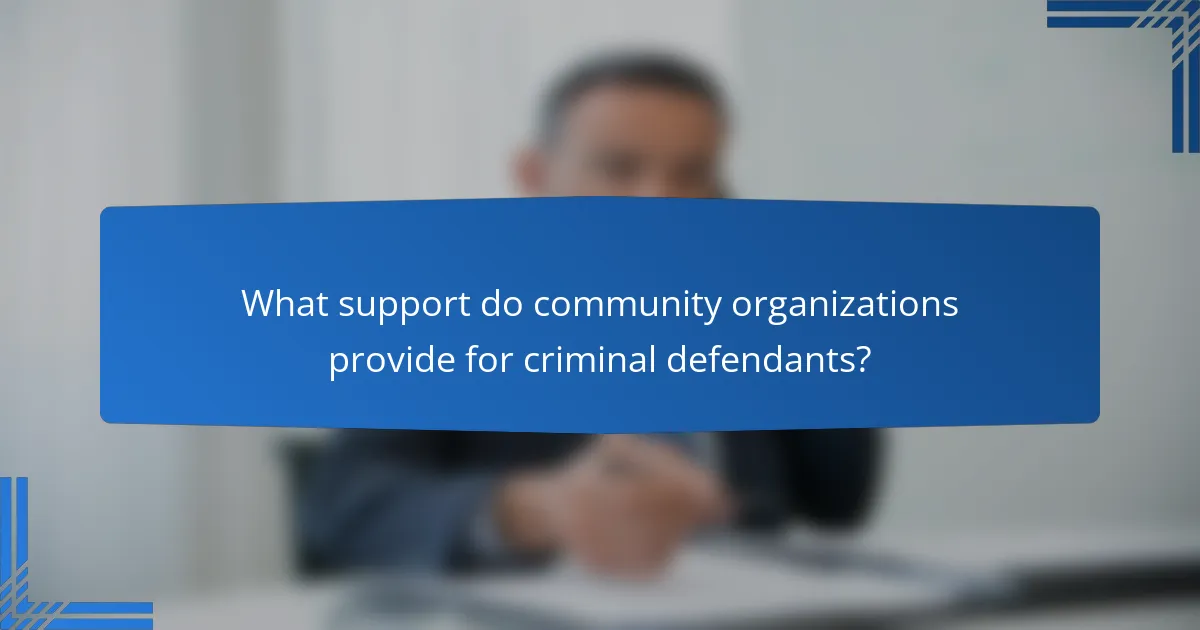
What support do community organizations provide for criminal defendants?
Community organizations offer vital support to criminal defendants through various services, including legal representation, emotional support, resource referrals, and advocacy initiatives. These services aim to assist individuals navigating the complexities of the criminal justice system, ensuring they have access to necessary resources and support.
Legal representation services
Many community organizations provide legal representation services to criminal defendants who may not afford private attorneys. These services often include access to public defenders or pro bono lawyers who can represent individuals in court.
It is essential for defendants to understand their rights and the legal process. Organizations may offer workshops or informational sessions to educate individuals about their cases, potential outcomes, and the importance of having legal representation.
Emotional support groups
Emotional support groups play a crucial role in helping criminal defendants cope with the stress and anxiety associated with their legal situations. These groups provide a safe space for individuals to share their experiences and feelings with others facing similar challenges.
Participation in support groups can foster a sense of community and reduce feelings of isolation. Many organizations facilitate these groups, often led by trained professionals or individuals with lived experience in the criminal justice system.
Resource referrals
Community organizations often serve as a hub for resource referrals, connecting defendants with various services such as housing assistance, mental health support, and job training programs. These referrals can help individuals rebuild their lives after legal troubles.
Defendants should take advantage of these resources, as they can provide essential support during and after the legal process. Organizations typically maintain a network of local service providers to ensure comprehensive support for their clients.
Advocacy initiatives
Advocacy initiatives by community organizations aim to influence policy changes and raise awareness about the challenges faced by criminal defendants. These initiatives may involve lobbying for legal reforms, organizing public awareness campaigns, or providing education on defendants’ rights.
Engaging with advocacy initiatives can empower defendants and their families, helping them understand the broader implications of their situations. Community organizations often encourage participation in these efforts to foster a collective voice for change within the criminal justice system.
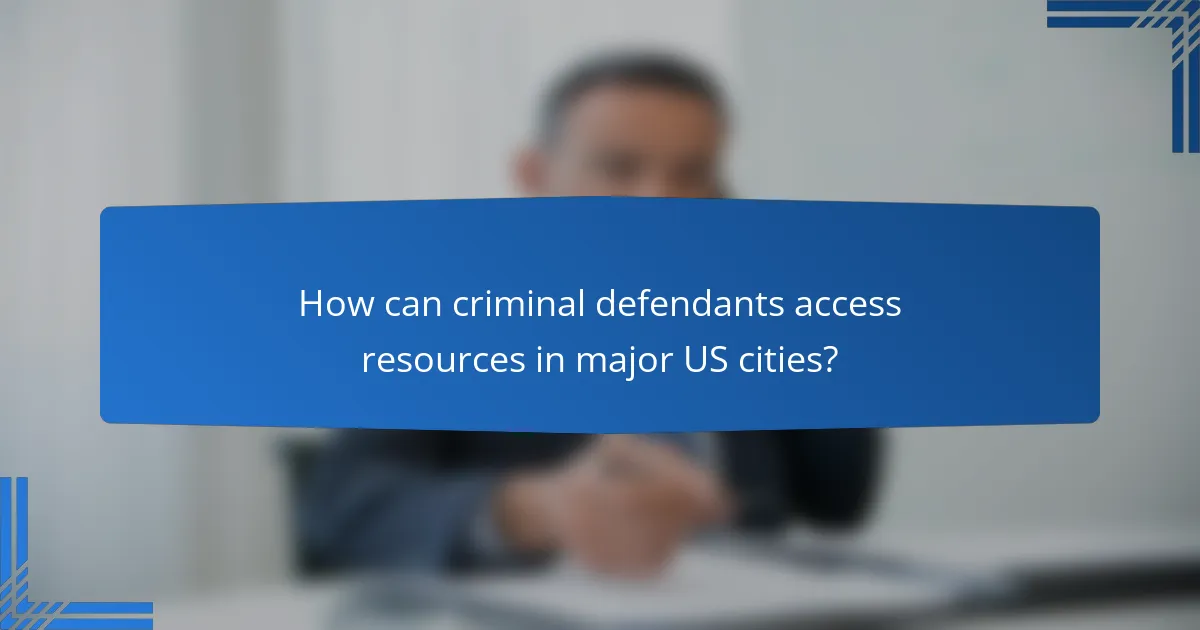
How can criminal defendants access resources in major US cities?
Criminal defendants in major US cities can access various resources through legal aid clinics, nonprofit organizations, and community outreach programs. These resources provide essential support, advocacy, and information to help navigate the legal system effectively.
Local legal aid clinics
Local legal aid clinics offer free or low-cost legal services to individuals facing criminal charges. These clinics typically operate in urban areas and can assist with legal representation, advice, and resources tailored to the specific needs of defendants.
Defendants can find legal aid clinics by searching online or contacting local bar associations. Many clinics have specific eligibility requirements based on income, so it is advisable to check these before seeking assistance.
Nonprofit organizations like the Innocence Project
Nonprofit organizations such as the Innocence Project focus on advocating for wrongfully convicted individuals. They work to exonerate those who have been unjustly imprisoned by using DNA evidence and other legal strategies.
Defendants can reach out to these organizations for support if they believe they have been wrongfully convicted. Many nonprofits provide resources for legal representation and can guide individuals through the appeals process.
Community outreach programs
Community outreach programs play a crucial role in connecting defendants with necessary resources and support networks. These programs often provide education on legal rights, access to counseling, and assistance with reintegration into society.
Defendants should look for local outreach programs that focus on criminal justice reform and support for individuals navigating the legal system. Engaging with these programs can help build a supportive community and provide valuable information on available resources.
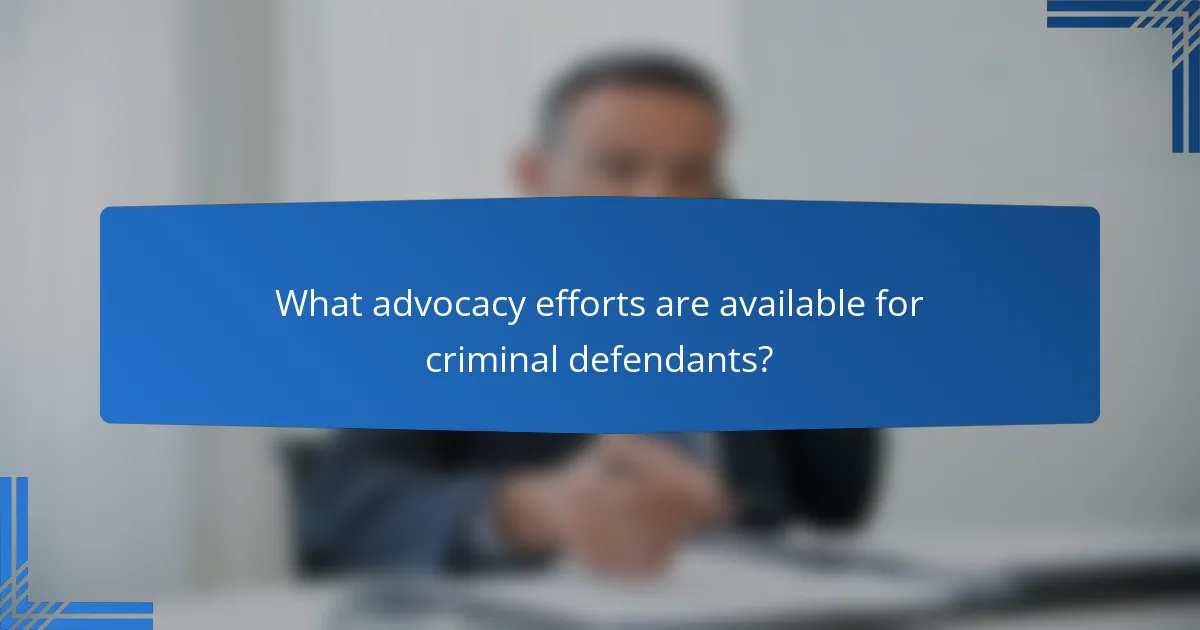
What advocacy efforts are available for criminal defendants?
Advocacy efforts for criminal defendants include various initiatives aimed at improving their legal representation and ensuring fair treatment within the justice system. These efforts often focus on policy reform, public awareness, and the formation of coalitions dedicated to criminal justice reform.
Policy reform campaigns
Policy reform campaigns seek to change laws and regulations that negatively impact criminal defendants. These campaigns often target issues such as mandatory minimum sentences, bail reform, and the decriminalization of certain offenses. Advocates work with lawmakers to propose new legislation or amend existing laws to promote fairness and justice.
Engaging in these campaigns can involve grassroots organizing, lobbying efforts, and public demonstrations. For example, successful campaigns in various states have led to the reduction of bail amounts or the elimination of cash bail altogether, allowing more defendants to remain free while awaiting trial.
Public awareness initiatives
Public awareness initiatives aim to educate the community about the challenges faced by criminal defendants. These initiatives often include informational campaigns, workshops, and social media outreach to highlight issues such as wrongful convictions and the importance of legal representation. Raising awareness can foster empathy and support for reform efforts.
Organizations may utilize storytelling, media coverage, and partnerships with local influencers to amplify their message. For instance, campaigns that share personal stories of individuals affected by the justice system can significantly impact public perception and encourage community involvement in advocacy efforts.
Coalitions for criminal justice reform
Coalitions for criminal justice reform bring together various stakeholders, including non-profits, legal experts, and community members, to work collaboratively on advocacy efforts. These coalitions often focus on specific issues, such as racial disparities in sentencing or the treatment of juveniles in the justice system.
By pooling resources and expertise, coalitions can create a more powerful voice for change. They may organize events, conduct research, and develop policy proposals that reflect the collective goals of their members. Joining a coalition can provide individuals and organizations with valuable networking opportunities and access to broader advocacy efforts.
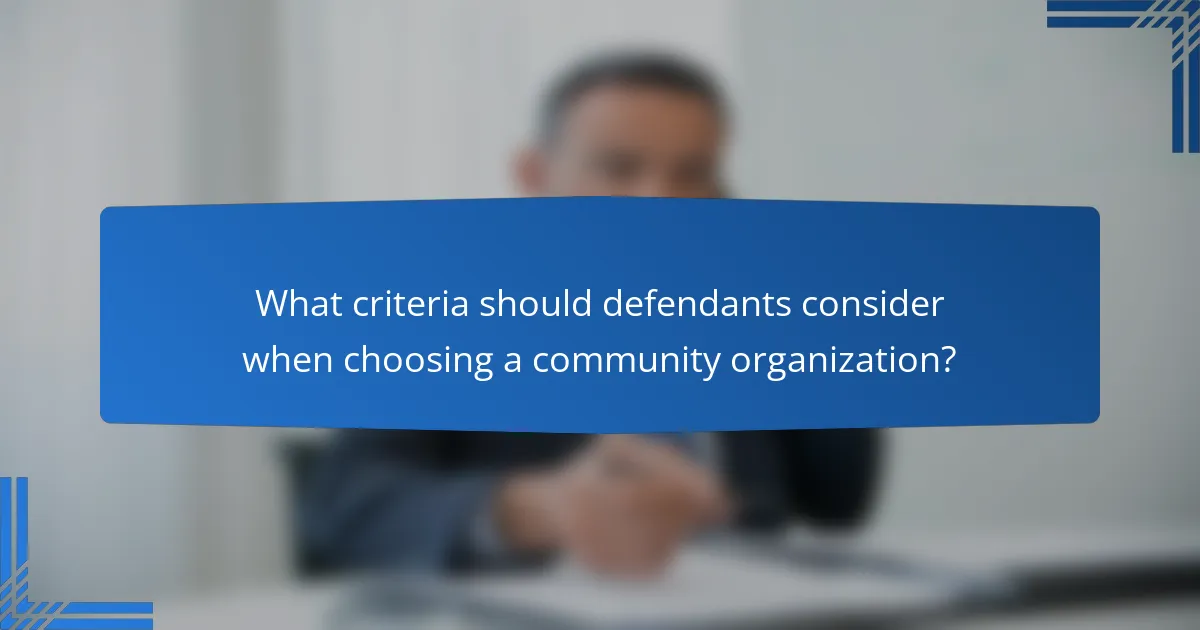
What criteria should defendants consider when choosing a community organization?
Defendants should evaluate community organizations based on their reputation, the types of services they provide, and their accessibility. These factors can significantly impact the support and resources available to individuals navigating the criminal justice system.
Reputation and success rates
When selecting a community organization, consider its reputation and historical success rates in assisting defendants. Look for organizations with positive reviews, testimonials, and a track record of favorable outcomes in similar cases.
Research local organizations through online platforms, community forums, or legal aid resources. A strong reputation often correlates with effective advocacy and support, which can be crucial for defendants facing serious charges.
Types of services offered
Different community organizations provide various services, including legal assistance, counseling, and educational resources. Identify what specific services you need, such as legal representation, mental health support, or job training, and ensure the organization offers them.
Some organizations may focus on specific demographics or types of offenses, so it’s essential to match your needs with their expertise. For instance, a group specializing in juvenile offenders may not be the best fit for an adult defendant.
Accessibility and location
Accessibility is a key factor when choosing a community organization. Consider the organization’s location, operating hours, and whether they offer remote services. Being able to easily access support can make a significant difference in your experience.
Additionally, check if the organization provides services in your preferred language or has resources for individuals with disabilities. This can enhance your ability to communicate effectively and receive the necessary assistance throughout the legal process.
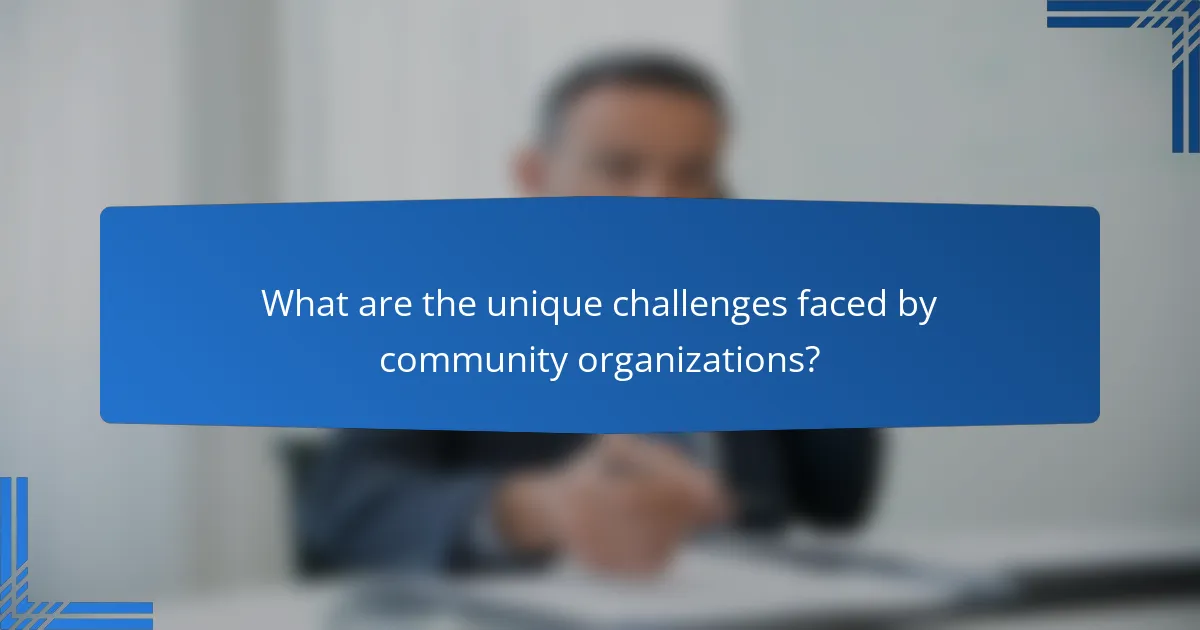
What are the unique challenges faced by community organizations?
Community organizations supporting criminal defendants encounter several unique challenges that can hinder their effectiveness. These challenges often stem from limited resources, staffing issues, and the complex nature of legal advocacy.
Funding limitations
Funding limitations are a significant hurdle for community organizations. Many rely on grants, donations, and government support, which can fluctuate and may not cover all operational costs. Organizations often find themselves competing for the same limited resources, making it difficult to secure consistent funding.
To navigate funding challenges, organizations can diversify their funding sources by applying for multiple grants, hosting fundraising events, or establishing partnerships with local businesses. It is crucial to maintain transparency and demonstrate the impact of their work to attract and retain donors.
Staffing and volunteer shortages
Staffing and volunteer shortages can severely impact the capacity of community organizations. Many organizations operate with a small team, often relying heavily on volunteers who may have limited availability or experience. This can lead to burnout among staff and volunteers, affecting service delivery.
To address staffing shortages, organizations should focus on recruitment strategies that highlight the importance of their mission. Offering training programs for volunteers can enhance their skills and commitment. Additionally, fostering a supportive work environment can help retain staff and volunteers, reducing turnover and ensuring continuity in services.
